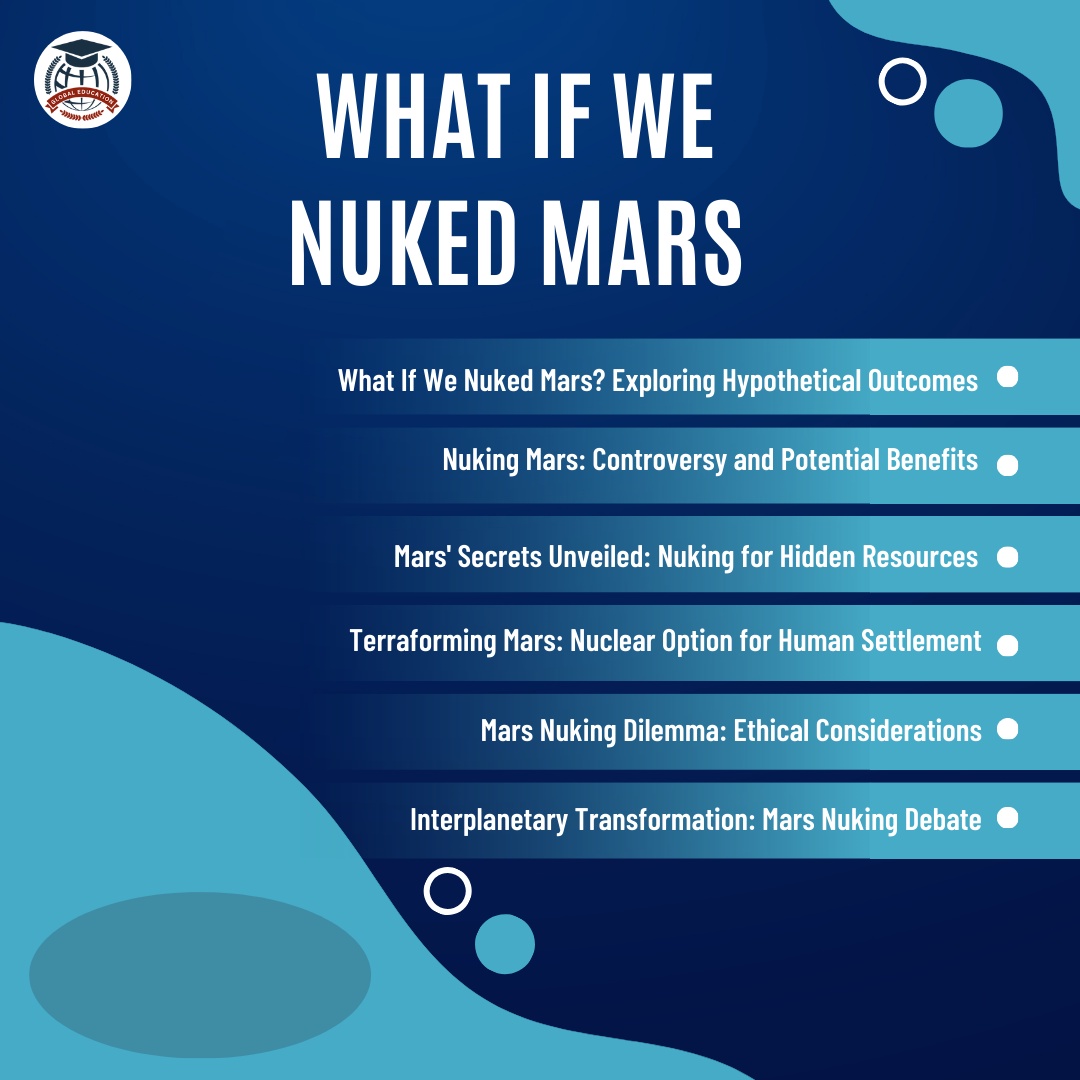Have you ever gazed up at the night sky and wondered about the mysteries of our neighboring planet, Mars? It's a place of fascination for scientists, space enthusiasts, and dreamers alike. But what if we were to contemplate a bold and controversial question: What If We Nuked Mars? 🤔💥
Before we dive into this speculative journey, let's be clear: this is a purely hypothetical scenario. The idea of nuking another planet is far from a current or future plan, but exploring such "what if" scenarios can help us understand the consequences, both intended and unintended, of drastic actions in space.
🔴 Mars, The Red Planet
Mars, often called the "Red Planet," has captivated our imagination for centuries. Its barren landscapes, polar ice caps, and potential for harboring life make it a prime candidate for future human colonization. Yet, the challenges of sending astronauts to Mars are immense, from the long journey through space to the harsh Martian environment.
🌌 The Hypothetical Scenario
Now, let's consider the scenario: What If We Nuked Mars? 🚀💣 In this hypothetical situation, we're not talking about causing harm or destruction but rather exploring potential applications of nuclear technology in space exploration and terraforming. Here are some aspects to ponder:
-
Terraforming Mars 🌱🪐: One possible application of nuclear technology on Mars could be to trigger controlled explosions in its polar ice caps. This would release vast amounts of water vapor and carbon dioxide, potentially jumpstarting a greenhouse effect to warm the planet.
-
Radiation Protection 🛡️👩🚀: Mars has a thin atmosphere that doesn't offer the same level of protection from cosmic radiation as Earth. Could underground nuclear shelters serve as safe havens for future Martian colonists?
-
Propulsion and Energy ⚙️🔋: Nuclear thermal propulsion could drastically reduce travel time to Mars, making it more accessible for human missions. Nuclear power plants on Mars could also provide a reliable source of energy for future colonies.
-
Astrobiology 🧪👾: By examining the subterranean regions of Mars, nuclear technology could help us search for signs of past or present life, buried beneath the surface.
-
Defense Against Asteroids ☄️🌌: Having nuclear capabilities on Mars could potentially help deflect or destroy incoming asteroids that might pose a threat to our planet.
-
Ethical and Environmental Concerns 🌏🤔: As we explore these possibilities, we must also consider the ethical and environmental implications of introducing nuclear technology to another celestial body.
🪐 Mars Terraforming: A Bold Idea
The idea of terraforming Mars, or making it more Earth-like, has been a subject of scientific study and science fiction for decades. Nuking the Martian polar ice caps might be a way to jumpstart the process. The immense heat generated by nuclear explosions could release trapped gases, thickening the atmosphere and raising temperatures.
However, there are significant challenges to consider:
- Ensuring the explosions are controlled to prevent unintended consequences.
- Managing the release of radiation and its impact on potential colonists.
- Monitoring the long-term effects on Mars' ecosystem, if any.
👩🚀 Nuclear Power for Mars
Another application of nuclear technology on Mars is the use of nuclear power plants. Mars receives only about half the solar energy Earth does, which poses a challenge for sustained human habitation. Nuclear reactors could provide the necessary energy for life support systems, water extraction, and more.
These reactors would need to be compact, highly efficient, and well-protected against potential malfunctions or accidents. They would also require extensive planning and oversight.
⚛️ Nuclear Thermal Propulsion
Traveling to Mars is currently a lengthy endeavor, taking several months. Nuclear thermal propulsion could revolutionize space travel by drastically reducing transit times. By heating hydrogen with a nuclear reactor and expelling it at high speeds, spacecraft could reach Mars much more quickly.
This technology could potentially make crewed missions to Mars more feasible and safer, as shorter travel times would reduce the risks associated with long-duration spaceflights.
🌌 The Quest for Life
Mars has long intrigued us with the possibility of life. Underground nuclear technology could play a crucial role in our search. Mars' subsurface might contain liquid water, where microbial life could exist. Sending rovers or drilling equipment equipped with nuclear power and sterilization measures could help us explore these hidden realms without contaminating them.
🌎 Planetary Defense
Mars isn't just an interesting destination; it could also serve as an ally in our solar system. The potential for using nuclear technology to deflect or destroy asteroids on a collision course with Earth is a critical consideration. Mars, with its thin atmosphere and lower gravity, might offer advantages for testing such methods.
🤔 Ethical and Environmental Implications
As we contemplate the idea of nuking Mars, it's essential to consider the ethical and environmental consequences. How would this affect any potential indigenous Martian life? What are the long-term effects on the planet's ecosystem? How do we ensure the responsible use of nuclear technology in space?
⏭️ Conclusion: Beyond the Hypothetical
"What If We Nuked Mars?" is a thought-provoking exercise that takes us into the realm of possibilities in space exploration and colonization. While this scenario is purely hypothetical, it highlights the importance of careful planning, ethical considerations, and international cooperation as we venture into the cosmos.
Let's keep exploring, keep dreaming, and continue pushing the boundaries of our knowledge about the universe, while always prioritizing the responsible and ethical use of technology.


No comments yet